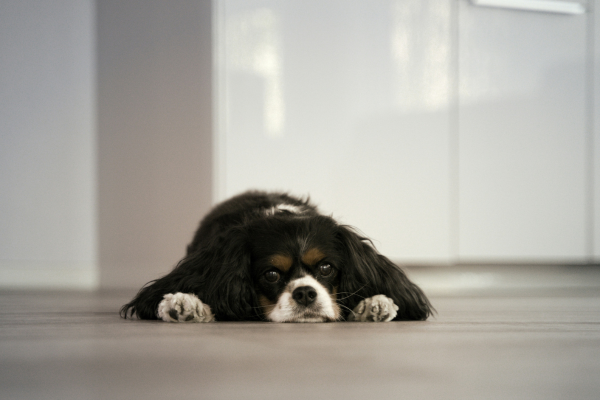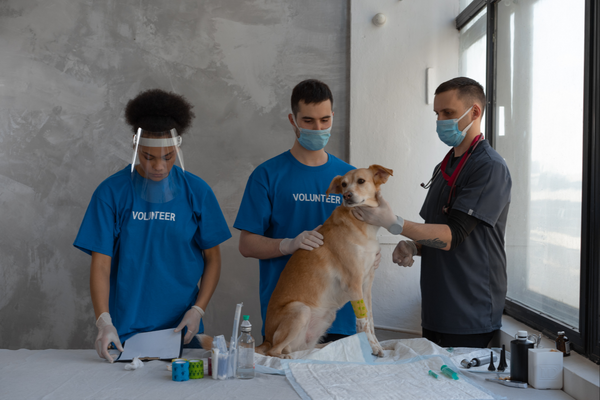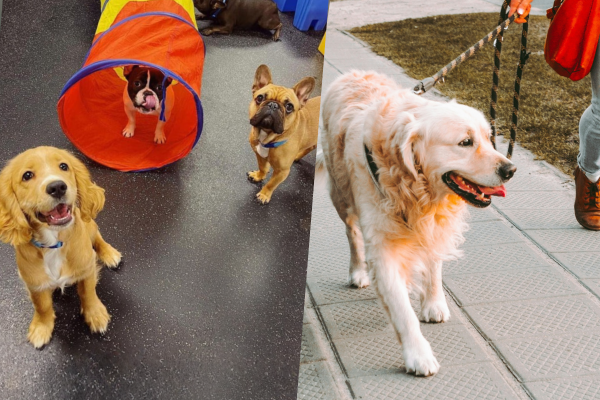As a loving pet parent, you never want to think that your dog is experiencing anything other than happiness. Unfortunately, the reality is that dogs can feel lonely just like humans.
In this post, we cover:
SIGNS OF LONELINESS IN DOGS
Every dog is unique, so your pup may experience more or less symptoms of loneliness than others. It is important that you keep an eye on their behavior to see if anything is out of the ordinary and consult with your vet to determine next steps.
Signs a dog may be lonely include:
- Destructive behavior: From chewing on household items to scratching at doors, feelings of boredom and loneliness can cause a pup to act out.
- Withdrawal: If you find your dog spends more time sleeping, avoiding interaction, or is less interested in playing, they may be feeling lonely and/or sad.
- Changes to how they eat: Some dogs may lose interest in food when they are lonely because of a loss of appetite.
- Increased barking/howling: Vocalization (barking, whining, and howling) is one way that dogs try to express how they’re feeling. If you catch your pup on your dog cam excessively whining or barking while you’re away or you hear them when you’re leaving, it can be a sign they feel discomfort, fear, anxiety, etc.
- Restlessness or pacing: You may notice your pup pacing, circling, or moving from various spots around your home without feeling settled, especially if they know you’re about to leave.
- Clinginess: Have you noticed your dog wants more of your attention and/or follows you around your home more often? A sudden increase in attachment could mean they feel lonely.
- Potty accidents: If your dog is already housetrained and they begin having accidents indoors (particularly when you are out of the house), it can be a sign of separation anxiety and a result of feeling panic or distress.
WHAT CAUSES LONELINESS IN DOGS?
Dogs are considered highly social animals. While they may have different personalities and comfort levels when alone, a lack of socialization (whether with humans or other dogs) can lead to feelings of loneliness.
Factors that contribute to loneliness in dogs can include:
- Spending time alone for an extended period (e.g., while you’re at work, at school, or traveling)
- A lack of mental stimulation
- Major life changes
- Changes in their routine, especially because of a change in your schedule
- A loss of a companion, as dogs can experience grief
- The dog’s breed, as Golden Retrievers, Bichon Frisés, Labrador Retrievers, Siberian Huskies, German Shepards, and French Bulldogs, among others, tend to be more social, energetic, and sensitive, making them more prone to loneliness.
HOW TO PREVENT MY DOG FROM FEELING LONELY
If you think your dog is lonely, or you are looking for ways to prevent loneliness, there are several steps you can take to help them feel content:
- Increase the amount of quality time you spend together by dedicating time to interactive play and giving extra cuddles.
- Add more physical exercise and mental stimulation into their routine with indoor/outdoor obstacle courses, treat puzzles/snuffle mats, etc.
- Expand your dog’s friend group so they can interact with other pups and tap into their natural pack instinct.
READ MORE: The Health Benefits of Dog Friendships
- If your pup must stay home alone, create a comforting environment, such as dedicating a spot with their familiar bedding, toys, and food/water within reach.
- Practice calm exits and arrivals so your pup doesn’t associate you leaving with stress.
- Maintain a routine to help keep their schedule predictable.
BRING YOUR DOG TO DAYCARE AT DOGTOPIA
At Dogtopia, we prioritize doggie wellness. With activities that cater to your pup’s physical, emotional, and social needs, daycare can provide a safe space where your dog can thrive as they receive the care they need from our professionally trained coaches.
As they socialize with other dogs that match their size, temperament, and play style, they can learn to increase their communication skills and become even more confident. Plus, they get to expend their excess energy through fun exercises, so you know that your pup will receive enough activity in their day.
READ MORE: The Benefits of Dog Daycare for Your Furry Friend
To help you gain even greater insight into your pup’s health and well-being, our exclusive DASH activity monitor lets you keep tabs on your dog’s wellness inside and outside the playroom by monitoring their steps, distance, time spent playing, and more. By detecting a change in behavior and improvements to activity levels over time, DASH can provide personalized insights into your pup’s progress.
Rather than worry that they’re lonely at home, you can rest assured that they’re having a blast at daycare! We even have doggy daycare webcams equipped in each playroom so you can tune in to all the tail wagging fun your pup’s having.
Reach out to a Dogtopia near you to get their daycare journey started.
On our website, you will find many helpful articles and videos about dog care, training, real-life stories, and inspiration for every dog lover. Explore more content and discover interesting insights from the world of dogs.











